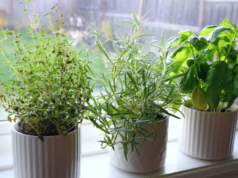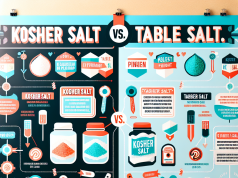Contents
How to Properly Store Herbs to Ensure They Stay Fresh for Longer
Proper storage is essential for maintaining the flavor and potency of herbs, and to prevent them from wilting, getting moldy, or losing their color and aroma. These tips will help you store your herbs properly to ensure that they remain fresh for longer:
- Keep them dry: Moisture is the enemy of fresh herbs. After washing them, make sure to dry them completely by gently patting them with a paper towel or using a salad spinner.
- Wrap them in paper towels: Once your herbs are dry, wrap them loosely in paper towels to absorb any remaining moisture. You can also wrap them in a clean kitchen towel or cheesecloth if you have these on hand.
- Store them in containers: Place your wrapped herbs in airtight containers or bags to prevent exposure to air and moisture. Glass containers with tight-fitting lids are ideal, but plastic bags with zip locks can also work.
- Label and date: Don’t forget to label and date your containers or bags so you know when you stored your herbs. This helps you keep track of their shelf life and avoid using herbs that are past their prime.
- Keep them cool: Store your herbs in the refrigerator’s crisper drawer or a cool, dark place away from direct sunlight, heat, and humidity. High temperatures can cause herbs to wilt and lose their flavor quickly.
By following these simple storage tips, you can keep your herbs fresh for up to two weeks or longer, depending on the type of herb. So the next time you buy fresh herbs, remember to store them properly to ensure that they stay fresh and flavorful for all your culinary needs.
My Kitchen Adventures
How to Properly Store Herbs to Ensure They Stay Fresh for Longer
If you love cooking with fresh herbs, then you know how quickly they can go bad. But the good news is, with a little knowledge and proper storage techniques, you can keep your herbs fresh for longer periods of time. Here are some tips:
1. Wash Them First
Before storing your herbs, make sure you wash them first. This will help remove any dirt or debris and extend their shelf life. To do this, gently rinse your herbs in cold water, then use a salad spinner or paper towel to dry them thoroughly.
2. Wrap Them in a Paper Towel
After you’ve washed your herbs, wrap them in a damp paper towel. This will help keep them moist and fresh for several days. Then place them in a plastic bag or storage container with a lid, and store them in the fridge.
3. Freeze Them
If you have leftover herbs and want to extend their shelf life, you can freeze them. Simply chop them up, place them in an ice cube tray, and cover them with water or olive oil. Then freeze them until you’re ready to use them. You can pop them out of the tray and use them in your favorite recipes.
4. Use a Herb Keeper
If you’re a serious herb lover, you might want to invest in a herb keeper. These containers are specifically designed to help extend the shelf life of fresh herbs. They have a water reservoir that you refill every few days, which helps keep your herbs fresh and hydrated.
5. Store Them in the Right Place
Finally, make sure you store your herbs in the right place. Most herbs are best stored in the fridge, but some, like basil, should be kept at room temperature. If you’re not sure where to store your particular herbs, do some research to find out.
By following these tips, you can keep your fresh herbs usable for days, and even weeks, longer than usual. Happy cooking!
Frequently Asked Questions about Properly Storing Herbs
Why is it important to store herbs correctly?
Improper storage of herbs can cause them to wilt, lose their flavor, and even spoil. Proper storage helps to ensure that your herbs stay fresh for longer periods of time, so you can use them in your cooking as needed.
What is the best way to store fresh herbs?
The best way to store fresh herbs is to first remove any rubber bands or ties around the stems. Next, rinse the herbs in cold water and gently pat them dry with a clean towel. You can then wrap the herbs in a damp paper towel and store them in a plastic bag in your refrigerator.
Can herbs be stored in the freezer?
Yes, herbs can be stored in the freezer. To do so, rinse and dry the herbs as you would for refrigerator storage. Then, chop the herbs as desired and place them in an ice cube tray. Cover the herbs with water and freeze. Once frozen, you can transfer the herb cubes to a plastic bag and store in the freezer until ready to use.
How long do herbs typically stay fresh?
The length of time that herbs stay fresh can vary, but typically they will last for a few days to a couple of weeks when stored correctly in the refrigerator. Frozen herbs can last up to several months.
What are some common signs that herbs have gone bad?
Signs that herbs have gone bad include wilting, browning, or noticeable mold growth. If your herbs have any of these signs, it is best to discard them and start with fresh herbs.
Why Use Herbs in Your Kitchen?
Herbs can take your cooking to the next level, adding a depth of flavor you can’t get from any other ingredient. But herbs aren’t just about taste – they’re also packed with nutrition and health benefits.
Flavor Enhancements
Herbs can add a complex layer of flavor to your dishes that make them much more interesting than bland or one-dimensional foods. Fresh herbs are the best, but using dried herbs is also acceptable. Here are a few herbs that really shine in the kitchen:
- Basil: Great for Italian recipes, especially tomato-based ones.
- Parsley: Adds a fresh touch to many dishes, and also helps combat bad breath.
- Cilantro: Common in Mexican and Southwestern cuisine, adds a bright and citrusy flavor.
Experiment with different combinations of herbs to create your own unique flavor profiles!
Nutrition Boosters
Many herbs are packed with nutrients that can help prevent disease and promote good health. For instance:
- Garlic: Contains a compound called allicin, which has antibacterial and antifungal properties. May also help reduce cholesterol levels.
- Oregano: High in antioxidants, which can help protect against cancer and other diseases. Also has antibacterial properties.
- Thyme: Contains several essential oils that have antimicrobial properties. May help boost the immune system, and relieve sore throats and coughs.
Adding these herbs to your dishes not only improves the flavor, but also the nutritional value!
Health Benefits
Herbs have been used for medicinal purposes for centuries, and many have been scientifically proven to have therapeutic properties. Here are a few examples:
- Peppermint: Great for relieving stomach cramps, indigestion, and nausea.
- Chamomile: Has a calming effect on the body and can help relieve anxiety, insomnia, and headaches.
- Ginger: Can help reduce inflammation and pain, as well as alleviate nausea and vomiting.
By incorporating these herbs into your cooking, you can benefit from their medicinal properties!
Properly Storing Herbs to Keep Them Fresh
- Remove any wilted or damp leaves before storing
- Keep whole herbs in a container with a small amount of water, like cut flowers
- Wrap herbs loosely in damp paper towels and store in a plastic bag in the fridge
- Avoid storing herbs near ethylene-producing fruits like apples, bananas, and tomatoes
- Freeze herbs by chopping them and placing in ice cube trays with a small amount of water or oil
- Label and date all containers to keep track of freshness and discard any spoiled herbs
Category – Pepper, Salt and Herbs








































